Trunks aloft, ears aflap, the younger elephants were panicking. They trumpeted and paced in circles, eyes focused on a water trough where the littlest elephant, a year-old baby, had toppled in. The calf might easily have navigated a natural water hole, but he was trapped by the steep walls of the pump-fed concrete trough, a remnant of agricultural days before Etosha became a national park. While the baby flailed in eye-high water, I stood helpless in an underground hide twenty yards away, hoping not to watch him drown. But through the dust and chaos emerged the baby’s mother and three grown females, perhaps all sisters. They walked calmly to the trough, knelt beside the terrified calf, lowered their trunks in concert, and with a bit of slipping and splashing, collectively extricated him from the water. Siblings and cousins rushed over to fondle him with their trunks. In the elephant world, as in ours, everyone dotes on the baby.
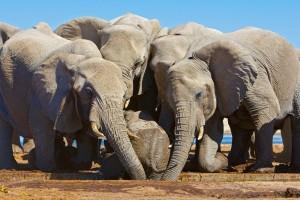
This wasn’t the only time I’ve seen elephants act with what can only be called compassion. At Dzanga Bai, a clearing in the Dzanga Sangha forest in Central African Republic, forest elephants congregate by the dozens to consume essential minerals. At the end of the rainy season, at Christmas time, I watched elephant bulls use tusks and trunks to excavate holes and drink mineral-rich groundwater. The biggest bulls hogged the best holes. When smaller bulls tried to sidle up to these prime spots, the larger males drove them off with a trunk slap, a tusk poke, or an all-out chase across the bai. This held true for all the smaller bulls but one – an emaciated little male whose trunk was nearly severed. He could control the upper half of his trunk, but the half below a wound dangled useless, impeding his ability to eat and drink. None of the researchers at the bai knew what had happened to the little bull; they debated whether he’d been bitten by a snake or caught in a snare. Of all the elephants at the bai, however, he alone was tolerated by the largest males. He alone was allowed to brush flanks with a big bull at a prime mineral hole, and if he interfered with another elephant’s drink, the injured bull received only a gentle push with a trunk – as much a caress as a reprimand.
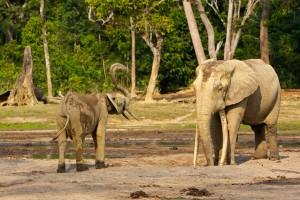
Such are the faces of community and caring among elephants: youngsters yelling “Oh no, do something!” in a crisis; wiser, calmer heads engineering a solution; communal relief at disaster averted, and a touching tolerance for the weak and injured. I can only imagine the grief felt by the elephants at Dzanga Bai when, the day after Christmas, the little bull with the maimed trunk finally died of malnourishment. Such grief is rampant right now throughout Africa, with 35,000 elephants killed in the last year alone from poaching. That translates to 96 elephants shot or poisoned each day, their faces hacked off with axes and tusks hauled away for the ivory trade.
Surely animals that express compassion for one another deserve the same from us. Elephants are suffering, and the privilege and joy of watching them in the wild is being stolen from us by poachers, ivory traders, and habitat loss. Each of us can and must take action, and many individuals and organizations are working full-time to protect elephants in the current crisis. Whether you make a donation, write a letter, share this story, or discourage someone from purchasing ivory, please do whatever you can to help.
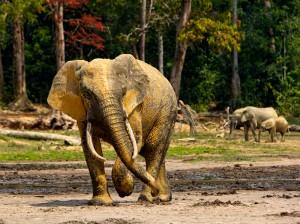
If we stand by, these extraordinary animals may soon be irrevocably lost. In the words of the the late poet Maya Angelou:
And when great souls die,
after a period peace blooms,
slowly and always
irregularly. Spaces fill
with a kind of
soothing electric vibration.
Our senses, restored, never
to be the same, whisper to us.
They existed. They existed.
We can be. Be and be
better. For they existed.
– from “When Great Trees Fall”
Want to take action? Please consider making a donation to Save the Elephants through the Wildlife Conservation Network.

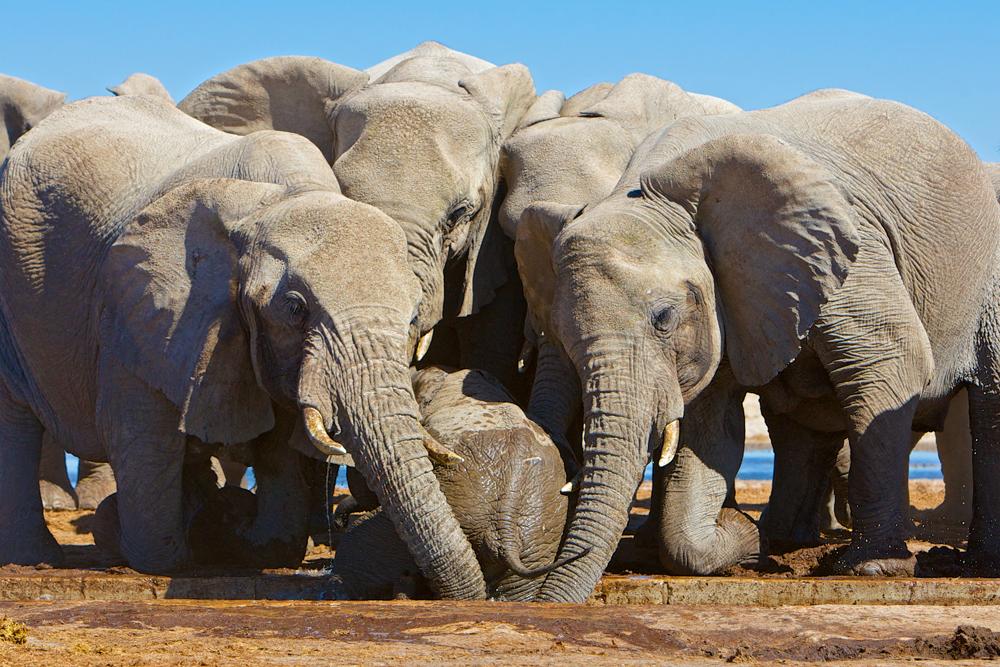
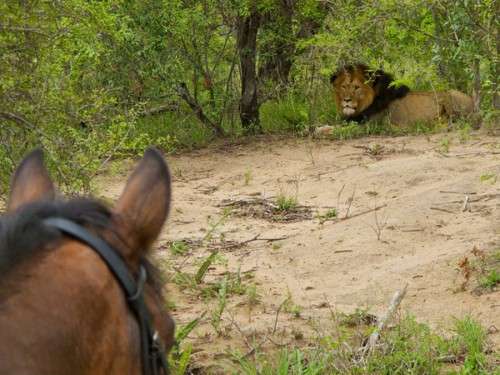
Lois Olmstead
8 Jun 2014Compassion. — Being able to connect with others or to have the capacity to love. We rather treasure this gift of Nature but compassion breeds something else — deep sadness and grief in the presence of the suffering of others. The impulse is to push it away or to fight against those circumstances which cause the suffering. I’m finding myself caught there and am trying to deeply understand and know that this pain is just another of Love’s faces.
Susan McConnell
8 Jun 2014Thanks for your lovely comment, Lois. I feel the same… But I’m optimistic that we can encourage others world-wide to appreciate the true cost of ivory products! And I know that you’re on the front line of that battle. Thanks for what you do.